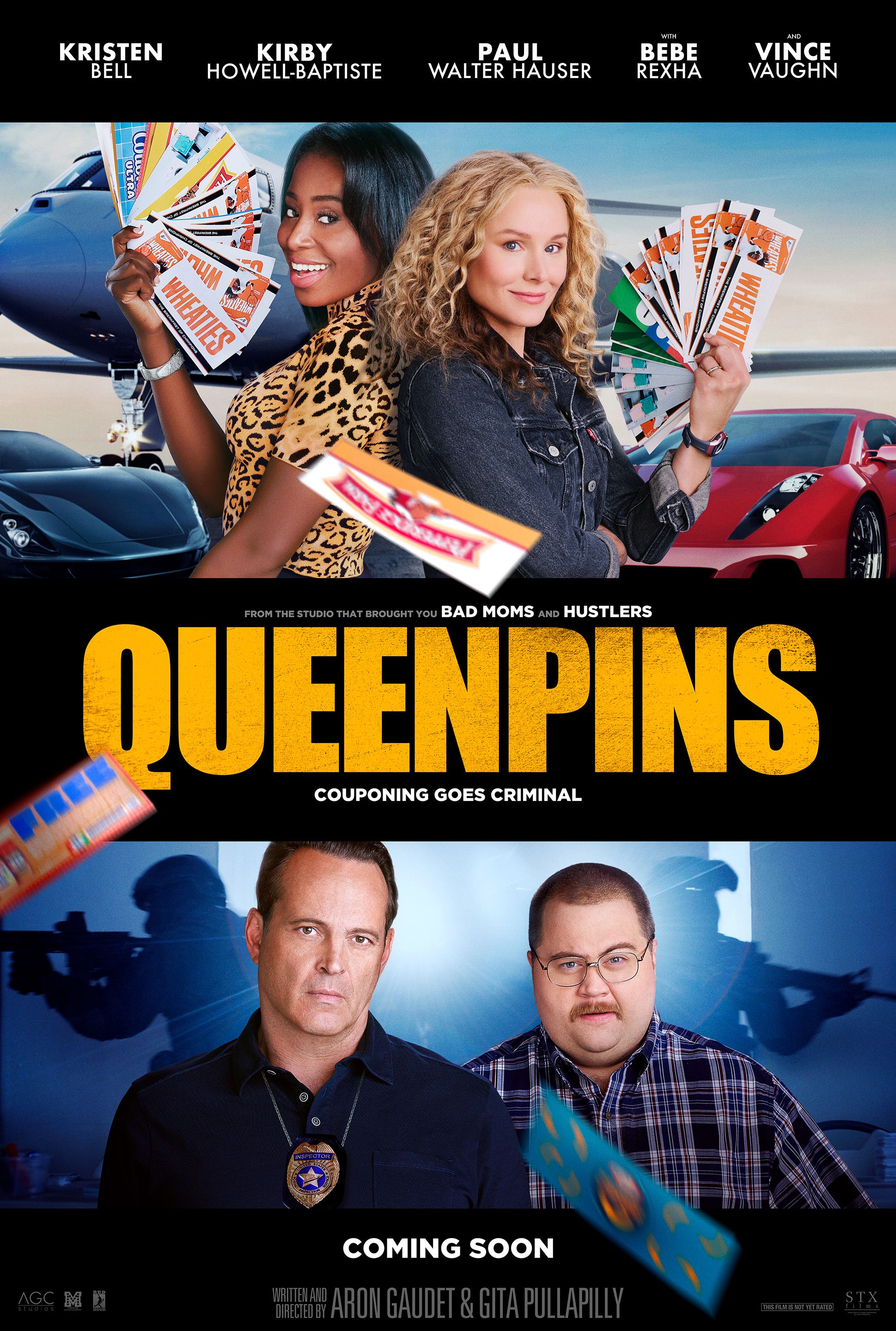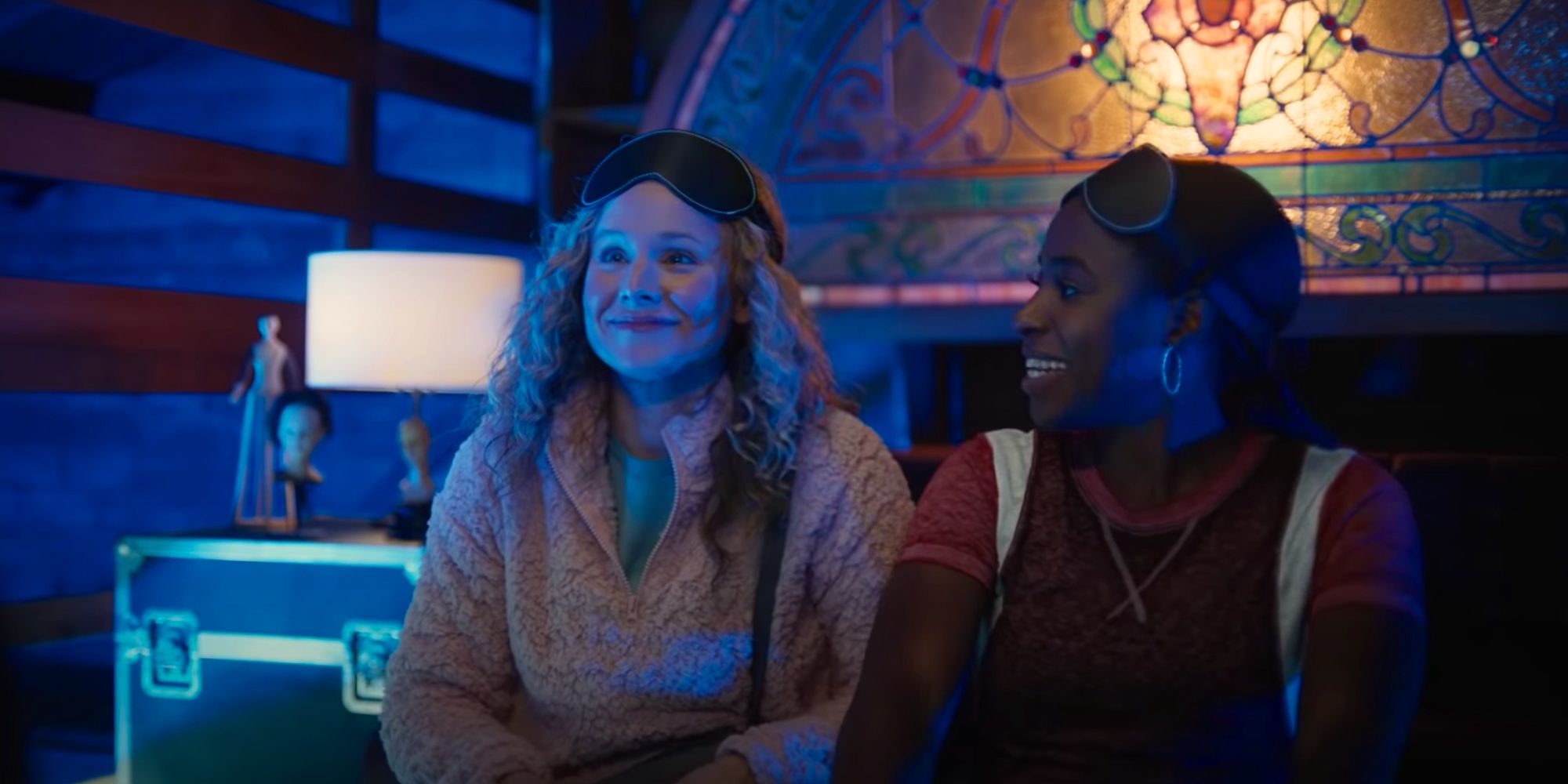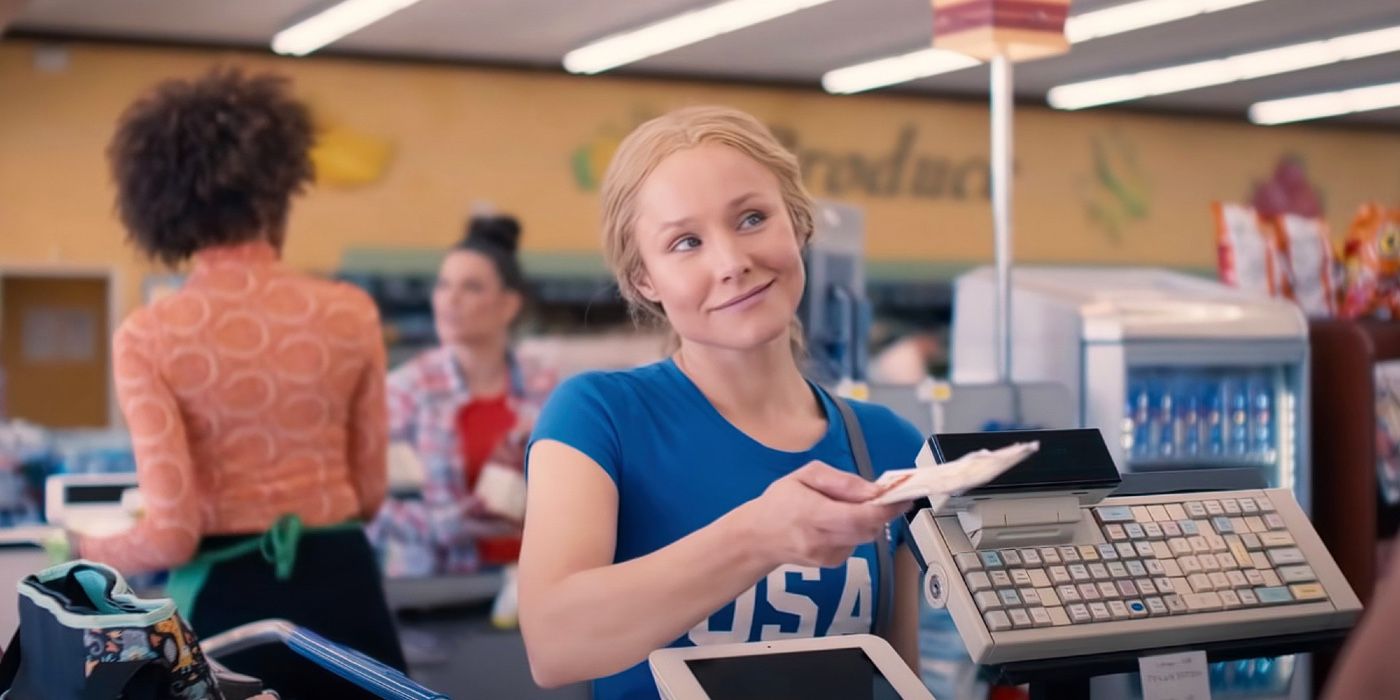Summary
- Queenpins is based on the true story of a massive coupon scam that made three Arizona women millions of dollars by selling counterfeit coupons.
- The scam involved reproducing and altering real coupons to create incredible deals, such as turning a $1 off coupon into $50 worth of free dog food.
- While the movie changes some details, such as the names of the characters and their motivations, the true story highlights the serious consequences the women faced, including prison time and restitution payments.
The comedy Queenpins' true story gives further context to the unique crime story about two friends behind a massive couponing scheme. Queenpins reunites actors Kristen Bell and Kirby Howell-Baptiste — who appeared together in Veronica Mars and The Good Place — as Connie Kaminiski and JoJo Johnson, respectively. In the movie, Connie receives a coupon as an apology after she complains to a company about stale cereal. This incident sparks an idea that ends up making her, and her best friend JoJo, a lot of money. Queenpins' true story is based on the couponing scam designed by three Arizona women.
The $40 million coupon scam may seem like a preposterous concept to some, but it is a case of fact being stranger than fiction as the events really did happen. In 2012, Arizona police arrested three women in possession of millions of dollars worth of fake coupons. Illegal couponing may not sound like a big deal, but on a large scale, it can cost corporations millions of dollars in lost revenue. Queenpins' true story scam served as ideal inspiration for a Hollywood take on the quirky crime, but as with most movies based on true stories, the movie makes some key changes.

Queenpins Cast And Character Guide: Where You Know The Actors From
The comedy Queenpins is inspired by the largest coupon scam in U.S. history. Here's the cast and character guide — and the real-life counterparts.Queenpins Is Based (Loosely) On A True Story
Robin Ramirez, Marilyn Johnson, And Amiko “Amy” Fountain Were The Real-Life Criminals Of The Story
The women at the center of Queenpins' true story were Robin Ramirez, Marilyn Johnson, and Amiko “Amy” Fountain. Ramirez, who was 40 years old at the time of her arrest, was considered the ringleader of the group. Johnson, then 54, and Fountain, 42, assisted her with the operation, which made them millions. The true crime story caught the attention of Sgt. David Lake of the Phoenix Police Department, who told local TV station KPHO [via Coupons in the News]: “The opulence and the money was the equivalent of drug cartel-type of stuff."
Regardless of the women's financial situation before they started the scheme, by the time it ended, they were living in luxury. The coupon scam was featured in the CBS documentary series Pink Collar Crimes in 2018, and Queenpins takes a more comedic approach to the story. However, the consequences faced by the women who perpetrated the crime were decidedly serious as they had to pay out a large sum and do some hard prison time for the scam.
Real-Life Coupon Scam: How It Worked
Counterfeit Coupons Were Created Outside The Country And Sold To Customers
Coupons in the News reports that Ramirez started selling fake coupons as early as 2007. In the Queenpins true story, her system involved sending coupons overseas to be reproduced and counterfeited in large quantities. Queenpins' true story is somewhat glossed over for the sake of time and the couponing scam itself was a victim of this. These coupons would be altered to amazing deals. For instance, a real coupon for $1 off Pringles could be changed to $50 worth of free dog food.
Some customers later admitted the deals seemed too good to be true, but they never wanted to question such good fortune. Johnson helped package and ship orders, and Fountain sometimes added hologram stickers to the fake coupons to make them look more legitimate. The coupons were then sold on eBay from multiple different accounts as well as from the group's own website, SavvyShopperSite. This site required an invite in order to access, and also included a warning not to freely share where customers purchased the coupons.

10 Greatest Movie Con Artists
Throughout film history, there have been some truly memorable con men (and women)! We take a look at some of the greatest.Who Are The Real-Life Queenpins
None Of The Real-Life Criminals Are Mentioned In Queenpins
Queenpins' true story doesn't directly feature the real-life criminals as Kristen Bell and Kirby Howell-Baptiste don't technically represent any of the three women, Robin Ramirez, Marilyn Johnson, and Amiko "Amy" Fountain. Ramirez started the couponing scam alone as she began selling counterfeit coupons back in 2007 and was joined by Johnson and Fountain after seeing the monetary potential of the scam.
While Connie and JoJo shared equal weight in their partnership, Ramirez was the one who orchestrated the scam from the beginning. She would have legitimate coupons reproduced overseas in large quantities and then sell them via her eBay account. During the trial in 2013, both Amiko Fountain and Marylin Johnson agreed to testify against the ringleader, causing Ramirez to change her plea to "guilty".
While Robin was the only one sentenced to jail, all three were forced to pay restitution to Proctor and Gamble to the tune of $1.2 million. Since the state of Arizona forbids criminals from making a profit off of selling their stories, none of the women benefited from the 2021 movie Queenpins. Fountain and Johnson still live and work in the Phoenix area and seem to have put the incident behind them. Ramirez has had her probation extended multiple times, and still works to pay off her court-ordered debt.
What Happened To The Real-Life Coupon "Queenpins"?
An Undercover Sting Operation Brought Down The Illegal Enterprise
Like in the ending of Queenpins, the women's fortune eventually came to an end. One of the victimized companies, Procter & Gamble, launched an investigation when they discovered some of the fake coupons during a routine audit. Forty businesses eventually filed fraud complaints, alerting the Coupon Information Corporation and local police. Private investigators worked with the Phoenix Police Department who went undercover to track down the three women involved. The investigation lasted eight weeks, during which officers pretended to be customers purchasing some of the counterfeit coupons.
A police raid found more than $40 million in fake coupons along with $2 million in other assets including 22 guns, cash, 21 vehicles, and a speed boat. Ramirez, Fountain, and Johnson were all arrested. Fountain and Johnson eventually pleaded guilty to counterfeiting, and Ramirez pleaded guilty to counterfeiting, fraud, and illegal control of an enterprise. She was sentenced to 3 years in prison and seven years probation while her friends served 3 years probation.

10 Best True Crime Movies Ranked
The best true-crime movies perfectly blend reality with fiction, and these films are particularly effective at that.Everything The Movie Changes
The Movie Paints The Criminals In A More Sympathetic Light
Queenpins' true story is markedly different than the movie. In Queenpins, authorities first become aware of a potential problem when a Loss Prevention Officer working for the grocery store chain called A&G Family Mart receives numerous complaints of fraudulent coupons. He initially goes to the FBI for help, but the case gets transferred to a U.S. Postal Inspector since the coupons are being physically mailed out (making the scam mail fraud). This angle allows the film to be more comedic in how it covers the investigation; it also takes focus away from the harm the scam did to companies.
Although Queenpins does mention Procter & Gamble by name, the businesses are portrayed as not really being affected by the scam — instead, the event is framed as "just a write-off" for them. In reality, P&G received financial compensation for the losses in revenue. Other companies also asked for reimbursement, but could not prove their products were involved in the coupon scheme. Queenpins chose not to include the reimbursement the women were court-ordered to pay, most likely to make them seem more sympathetic to the audience.
Other key changes in Queenpins are also meant to further endear the two lead women to audiences. Connie chooses to take full responsibility for their crimes to protect JoJo. Yet, in Queenpins' true story, Johnson and Fountain turned on Ramirez in exchange for lighter sentences. The movie also gives Connie a sympathetic backstory as pregnancy complications are the cause of her and her husband's financial struggles, which lead her toward extreme money-making schemes.
The movie simplifies the women's counterfeiting system as well. In real life, they would send real coupons overseas to be altered and mass-produced. In Queenpins, they simply stole excess coupons from a factory in Mexico. All of their "fake" coupons were in fact real, just being distributed in much larger quantities than companies wanted. Queenpins also reduces the women's sentences. JoJo receives 10 days of jail time and one-year probation while Connie receives 11 months of jail time. Neither of them learns their lesson from this though in the movie Queenpins because the film ends with Connie and JoJo planning to start their coupon scam all over again, this time overseas.
How The Queenpins Directors Turned A Scam Into A Story
The Filmmakers Worked To Balance The Comedy With Authenticity
Directors Aron Gaudet and Gita Pullapilly spoke to SlashFilm about how they turned a real-life scam into Queenpins. Pullapilly revealed she first heard about a $40 million couponing scam on a coupon blog, and she happened to have the name of the Phoenix, Arizona detective that worked on the case. Shortly after reading about the crime she contacted Gaudet, wondering if something so obscure was real. The pair then called the detective and found themselves deep in research for what would soon be the story of Queenpins, despite the duo never making a comedy before.
Gaudet and Pullapilly revealed that a tremendous amount of research went into making Queenpins. Gaudet mentioned that the duo took "deep dives" into the psychology of couponing, postal inspectors, and so much more to get the story right. While Pullapilly mentioned that social issues were also layered throughout the story, Gaudet hammered home that the story needed to have authenticity:
"We researched a lot because, again, we treated it the same way and we wanted it to feel just as real and authentic and layered. We would never want to do a comedy that's just a surface-level silly comedy."
In looking at the psychology of couponing, Gaudet found that people do get a small "high" from using coupons and that there is a "whole psychology behind any buyer when they pick up what they want to buy." Research into the postal service revealed that postal inspectors are the oldest branch of American law enforcement, something that Pullapilly wanted to pay homage to and "write this love letter to the post office." The Queenpins true story is stranger than fiction, and a lot of work on Gaudet and Pullapilly's part went into making it a success.

Queenpins
- Release Date
- September 10, 2021
- Director
- Aron Gaudet , Gita Pullapilly
- Cast
- Kristen Bell , Dayo Okeniyi , Eduardo Franco , Marc Evan Jackson , Stephen Root , Paul Rust , Joel McHale , Bebe Rexha , Kirby Howell-Baptiste , Annie Mumolo , Nick Cassavetes , Vince Vaughn , Paul Walter Hauser
- Main Genre
- Comedy
- Writers
- Gita Pullapilly , Aron Gaudet
- Cinematographer
- Andrew Wehde
- Producer
- Linda McDonough, Nicky Weinstock
- Production Company
- AGC Studios, Marquee Entertainment, Red Hour Productions






